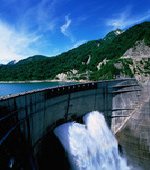 Innovations in Water: Projects and Challenges
Innovations in Water: Projects and Challenges
|
In the context of their programme on innovations in the water sector, the ISESCO and the CMI have just organized a two day seminar in Beirut (Lebanon), on 8 and 9 May, on the subject of "Innovations in the water sector and the role of young entrepreneurs in the Mediterranean". The participants presented their projects and the challenges that they face. |
|
|
According to Nathalie Abu-Ata, who is responsible for the CMI's water initiatives, the objective was to "bring together young entrepreneurs with innovative projects involving water, renewable energy and new technologies, in order to improve understanding of the challenges they face and identify possible solutions by facilitating exchanges between businesses and organizations in the Mediterranean basin". "Blue gold" is a major issue for the Middle East and North Africa (MENA). Most countries in this region are faced with an increasing depletion of their water resources. Innovation in this sector is therefore vital for the future. According to Samantha Constant, international consultant for the World Bank, "this two day seminar highlights water collection techniques and the role of energy in the water sector. It also focuses on the available information and communication technologies, in order to establish a platform for exchanges". Among the experiences presented at the seminar, was that of Sherif Hosni, CEO of Schaduf in Egypt. This fledgling business's ambition is to provide a solution for poor rural populations who come to live in cities, by offering them the possibility of low cost investment in urban micro-farms set up on the roofs of buildings. The farms are able to produce good harvests and a sustainable income. "A new way of farming", explains Sherif Hosni, that would enable these populations to "increase their incomes by 60% in one year". Schaduf supplies his customers with all the necessary tools and services to manage the micro-farms. The company also sells their harvests. For Sherif Hosni, "off-the-ground farming is an innovative concept. Evapotranspiration enables 50% savings in water consumption and avoids the use of pesticides". The project faces numerous challenges and requires appropriate tools to be put into place. Among these, Sherif Hosni cites micro-loans, "the banks are still very cautious and difficult to convince, making it important to establish solid partnerships with them and with NGOs". Particularly since the cost of these urban micro-farms is not very high (around USD 700 to 2500 depending on the area of roof covered). Centrivision, again based in Egypt, has just developed some innovative software. It enables farmers to receive via the Internet, SMS or their smartphone, all the information necessary to support good farming practices in their location. Islam Khalil, one of its developers, explains that "farmers can access a vast amount of data, including the weather forecast, a calendar for the use of pesticides and fertilizers, the use of grey water, etc.”. Another innovative project takes us to Jordan. A Dutchman, Michael Schuring, observed that Jordan is facing serious water shortages, which will become worse in another thirty years. His company, Desert Tulip, decided to import the Groasis technology and the "waterboxx". This "intelligent water storage" enables the capture of water from condensation and from rain, thereby enabling trees to be planted in arid areas, without an additional irrigation system. This new method to reduce the consumption of blue gold by crops paves the way to the reforestation of areas of dessert. These innovations, like many others presented at the seminar, involve overcoming numerous challenges. To start with, there are issues with the long-term funding of projects, and the development of innovative ideas. The creation of a network of innovative entrepreneurs in the water sector could help resolve some of these problems. Samantha Constant considers that this type of network should be exclusive, in order not to appear as "yet another network". In short, it would serve as a platform to share experiences and expertise, by connecting the various companies in the Mediterranean region (but not exclusively) and by promoting green economies through innovative solutions based on water. Such a network could also play a lobbying role and connect innovative entrepreneurs with business incubators and funding bodies. |
|
| Contact information |
Marseille Center for Mediterranean Integration (CMI)
(email: lfalconetti@worldbank.org) |
|---|---|
| News type | Inbrief |
| File link |
http://www.cmimarseille.org/Water-Innovation.php |
| Source of information | Marseille Center for Mediterranean Integration (CMI) |
| Keyword(s) | water innovation, pesticides |
| Subject(s) | AGRICULTURE , ANALYSIS AND TESTS , CHARACTERISTICAL PARAMETERS OF WATERS AND SLUDGES , DRINKING WATER , DRINKING WATER AND SANITATION : COMMON PROCESSES OF PURIFICATION AND TREATMENT , ENERGY , HEALTH - HYGIENE - PATHOGENIC MICROORGANISM , HYDRAULICS - HYDROLOGY , INDUSTRY , INFORMATION - COMPUTER SCIENCES , INFRASTRUCTURES , MEASUREMENTS AND INSTRUMENTATION , METHTODOLOGY - STATISTICS - DECISION AID , NATURAL MEDIUM , PREVENTION AND NUISANCES POLLUTION , RISKS AND CLIMATOLOGY , SANITATION -STRICT PURIFICATION PROCESSES , SLUDGES , TOOL TERMS , WATER DEMAND , WATER QUALITY |
| Relation | http://player.vimeo.com/video/46422019 |
| Geographical coverage | Lebanon, |
| News date | 27/07/2012 |
| Working language(s) | ENGLISH |
 you are not logged in
you are not logged in





